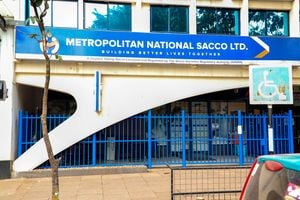
Some of the founding members of Gusii Mwalimu Investment Company Limited demonstrate at Gusii Mwalimu Sacco premises in Kisii town on September 19, 2024.
Mr Thomas Mogire was 24 years-old when he was employed as a teacher in 1972.
Two years into the profession, he joined other 8,211 like-minded young teachers, in forming an investment company called Gusii Mwalimu Investment Company Limited (Gumico).
Each member contributed Sh20 every month.
As the founding chairman of the company (Gumico), Mr Mogire envisioned a future where teachers would live comfortably in the later years of their employment and even after retirement.
The company was incorporated in 1982 obtaining registration No.C20/82 from the registrar of companies.
Members continued with their contributions and Gumico managed to purchase four development plots in Kisii town.
By then, the founding members had contributed about Sh1,760 each, which was a lot of money then in President Daniel arap Moi’s Kenya of the 1980s.
They built the Gusii Mwalimu House and Mwalimu International Hotel, adjacent to the present-day Kisii County Assembly.
Mr Mogire led his members further into securing a loan from Kenindia to purchase 26,000 acres of land in Rumuruti, Laikipia County.

Thomas Mogire, the founding chairman of Gusii Mwalimu Investment Company Limited.
Gumico's target was to secure at least three acres for every member.
Today, Mr Mogire is 78.
We meet him at Keroka in Nyamira County.
The father of eight is desperate and wishes that a miracle would happen and he would get the savings of his youthful years.
"We are dismayed that we are being told that we do not have the investment, Gumico. Our investment has been stolen. Younger people are enjoying our investment. They have since referred to us as dead wood," Mr Mogire says.
Martha Onsomu, 76, was also a founding member of Gumico, having joined it at 26 years old.
Like every other member, she contributed Sh20 per month. The aim was to secure a comfortable life for herself and her six children.
However, she is now aged with nothing to show for it and her children have become adults without benefiting.
"When we bought land we thought that it would help us during old age and even buy medicine for ourselves. Some members have died and majority are old and sickly," said Ms Onsomu.

Martha Onsomu, a founding member of Gusii Mwalimu Investment Company Limited.
For 10 years now, the founding Gumico members have been seeking justice to try and pursue justice.
Cumulatively, Ms Onsomu notes that surviving members and the children of those deceased have contributed nearly Sh5 million to pursue justice in courts.
"No court has ever listened to our cry. They tell us that we are time-barred," she says.
At the Court of Appeal, she claimed, judgment was issued, withholding the High Court judgment, even without them being told to go and testify.
More on the court judgements later.
After President William Ruto came into power, the disgruntled senior citizens have petitioned him thrice but justice remains elusive.
They have also petitioned Deputy President Rigathi Gachagua once but no feedback ever came from Harambee House Annex.
“One day the elders occupied the Registrar of Companies office in protest but the journalists who came to cover the story "talked to the Registrar of Companies officials and left without asking us any questions", said Ms Onsomu.
Now, the elders have resolved to occupy the Gusii Mwalimu Sacco premises in Kisii town on the 19th of every month, hoping that someday, someone will hear their cries.
"Every month we shall be going there; walking with two sticks. Those elders who can die will die there... until when the president shall hear us," said Ms Onsomu.
So, where did the rain start to beat Gumico members?
It started with a Sh6 million loan that the company was struggling to service after they took the funds to expand their investments in Rumuruti.
By now the Gusii Mwalimu Sacco was one of their tenants at the Gusii Mwalimu House, paying rent directly to Gumico.
Gumico approached the Sacco to help them offset the loan and accrued interest by purchasing shares in the company.
The Sacco became member number 8,213, and a majority shareholder.
The Gusii Mwalimu Sacco bought 400,000 shares at Sh20 each enabling the loan to be dispensed with.
The new entrants then began to allegedly singularly run the affairs of Gumico on June 15, 1990.
Gusii Mwalimu Sacco is alleged to have engaged a liquidator in 1999. It is disputed whether or not Gumico leadership gave approval for this.
In 2017, Gumico filed an application before Justice David Majanja at the Kisii High Court, seeking a declaration that the alleged dissolution of the company vide gazette notice no.3586 of June 10, 1998, was irregular, never took place and was not in accordance with provisions of the Company Act CAP 486 Laws of Kenya (Repealed).
The team also wants a declaration that the company (Gumico) be restored to the register.
However, the now-deceased judge established that Gumico was time-barred since they ought to have sought redress within two years from the date of dissolution as per section 338(1) of the Repealed Act.
Justice Majanja had also found out that actions wanting to restore the company to the registrar would have been initiated within 10 years from the time of the publication of the Gazette Notice, which was published on June 26, 1998.
In the alternative, the petitioners would find refuge in Section 26 of the Limitation of Actions Act which provides that the period of limitation does not begin running until when the Plaintiff has discovered the fraud or mistake.
However, this too could not rescue the elders at the high court as Justice Majanga established that the petitioners were aware of the dissolution of the company and alleged fraudulent acts as early as 1999 and had proceeded to file Kisii CMCC Suit No. 711A of 1999.
Dissatisfied, Gumico lodged an appeal at the appellate court in Kisumu before justices Wanjiru Karanja, Asikae Makhandia and Sankale Ole Kantai.
On September 23 the three-judge Bench dismissed Gumico's appeal saying that the application lacked merit.
“The trial court (High Court) rightfully found as a fact that the petition was time-barred based on the evidence tendered before it. There is therefore no basis for us to interfere with that finding. On the whole, we are convinced that the trial court did not err in its judgment and the appeal herein is bereft of merit and is accordingly dismissed with no order as to costs,” read the Appellate court’s judgment.
However, Mr Mogire insists that from Gumico’s side of the story, they only learnt about the alleged takeover of their investment in 2014.
"We do not have any of our investments. The pieces of land in Rumuruti and in Kisii town are all gone. Our company no longer exists, according to those who took over," said Mr Mogire.
At the same time, the retirees have now lodged an appeal at the East African Court of Justice in Arusha, Tanzania, to challenge dissatisfying judgments from Kenyan courts.
They are accusing the Kenyan judiciary of basing its judgments on an alleged fraudulent piece of evidence presented by the respondents.
The said piece of evidence is the Gazette Notice No.3586 of June 20, 1998, by the registrar of companies which stated that Gumico had been dissolved through voluntary liquidation.
"There was no proposal by the validly elected directors of the applicant to have the company dissolved. The applicant, Gumico, therefore comes to this honourable court with a view of having the conduct of the agents of a state party who unilaterally... forced the applicant into dormancy and efforts to revive the company by its directors has been frustrated by the respondent herein," reads the application in part.
Gumico explains to the regional court that the company was registered in 1982 pursuant to the provisions of the Company Act, Laws of Kenya (Repealed).
The case has the Attorney General of the Republic of Kenya as the respondent.
The Attorney General, Gumico says in court papers, is being sued on behalf of the Kenyan government through the actions of omission and commission of the state organs of the Kenyan government.
The company avers that the East African Court has the jurisdiction to handle their appeal pursuant to Article 23(2) of the EAC Treaty, which gives it the power to entertain and challenge judicial decisions by municipal courts including apex courts within the East African Community.
Gumico wants the court to find that the persons who allegedly appointed the liquidator had no authority of the company to do so and the appointment of the liquidator was irregular ab initio.
"The judges of the municipal and superior courts have deliberately been refusing to address the real issues affecting the applicant company and have been basing their reasoning that the 1st respondent had provided a proof of a gazette which showed that the applicant company was rightfully dissolved, which has necessitated the filing of this reference with a view of getting justice from this court," reads the application in part.
Gumico advances that the Attorney General, under which the Registrar's office is domiciled, failed to take responsible care as the custodian of the company files, allowing access to company files with the help of an insider.
This, they allege, led to the falsification of receipts and records.
At the regional Court of Justice, Gumico argues that the Kenyan judges of the respondent have no grasp of the law.
In particular, it wants the court to find that some 14 directors purporting to be those of Gumico and working in cohorts with the registrar purported to dissolve and sell the company when the law only recognised 10 directors.
They also want the court to establish that the alleged dissolution was fraudulent.
Gumico Secretary James Ratemo wondered why a country would allegedly persecute its elders.
"The people who started this thing are old, blind or dead. Why should we be deprived of our only investment? We do not understand what is happening!" said Mr Ratemo.









